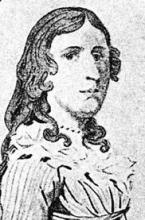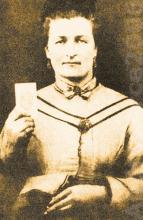inspiration + perspiration = invention :: T. Edison ::
Next week I will appear in one act show by a local playwright, Blalock's Discharge. It tells the story of a young woman, Malinda Blalock, who disguised herself as a man to fight with her husband in the Civil War. Not only is it appropriate to remember her on this week of Veteran's Day, but also the other women who decided to take up arms (and pants) for their country.

I first learned about Deborah Sampson, now the Official Heroine of the Commonwealth of Massachusetts, from a biography we read in elementary school. In 1782 she enlisted as "Robert Shurtliff" and served as a private in the Continental Army, helping to combat loyalist forces after the British surrender. She suffered several wounds in battle, and once performed an operation on herself rather than allow a surgeon to discover her sex. She was eventually discovered and given an honorable discharge in 1783, and even awarded a pension by the Massachusetts legislature later in life.
A few years ago I learned about two more Revolutionary-era women who served during a visit to the Charleston Museum. A painting of two women on horseback, Elizabeth Grace and Rachel Martin, was on display with the following explanation (taken from Elizabeth Ellet's The Women of the American Revolution):
One evening intelligence came to them that a courier, conveying important despatches ... was to pass that night along the road, guarded by two British officers. They determined to waylay the party, and at the risk of their lives, to obtain possession of the papers. ...The young women disguised themselves in their husbands' clothes, and being well provided with arms ... the heroines awaited the approach of the critical moment.... Presently the courier appeared, with his attendant guards...the disguised women leaped from their covert in the bushes, presented their pistols ... and demanded the instant surrender ... of the despatches. The men were completely taken by surprise, and in their alarm at the sudden attack, yielded a prompt submission. ...No time was lost in sending the important documents by a trusty messenger to General Greene." Later, the officials reported "... they had been taken prisoners by two rebel lads."

Malinda Blalock is noteworthy for not only serving as a North Carolina veteran of the Civil War, but for being the only woman to serve on both sides of that conflict. Natives of North Carolina's Appalachian mountains, she and her husband Keith decided to join the Confederates with the hope of switching sides once they marched into the North. Eventually she was shot in action and discovered; her husband promptly rolled in poison oak and pretended to have an infectious disease, prompting the army to award them both discharges. They eventually took part in Union raids against their home.
Our play focuses on the emotional toll this life took on them, as Malinda and her husband deal with the aftermath of a raiding party gone south. It's a fun role, with a lot of good interaction between me and my costar. I also love that it presents an actual slice of history (with appropriate dramatizations).
You can read more about Malinda and Keith at the North Carolina History Project. For more information on other women vets in disguise, check out this online exhibit by the Pew Center for Arts & Heritage and the Heritage Philadelphia Program. It features information on women soldiers, sailors, and even actors who all pretended to be men to get the job done.
One final thought to ponder: the women we know of are only those who are recorded in history. Most of them were only discovered due to suffering injury in battle. How many more women might there be who fought, never to be found out or recognized?





